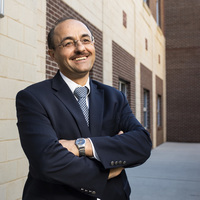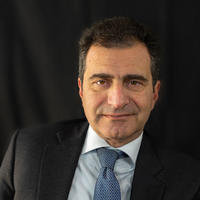Papers by Antônio Sampaio

International Review of the Red Cross, 2016
The rising pressures of urbanization in fragile and conflict-affected countries have increased co... more The rising pressures of urbanization in fragile and conflict-affected countries have increased concerns about the vulnerability of cities to armed threats. Changes in the character of armed conflict during the twenty-first century and its effects on cities in the developing world have exposed gaps in the planning and practice of peace and security, which retain a “nation-State bias” that circumvents local perspectives and agencies. Whereas full-scale use of military power in cities remains as destructive today as it has ever been, international organizations such as the United Nations have called for changed approaches to State tactics in urban areas. Mechanisms designed to prevent conflict or to help countries transition back to peace are particularly key if massive human and economic damages are to be avoided in a world of increasingly dense cities. Another key concern is the vulnerability of developing-world cities to low-intensity, if protracted, forms of violence by non-State a...

Journal of Illicit Economies and Development, 2021
Rapid urbanisation in countries undergoing or recovering from armed conflict has imposed severe s... more Rapid urbanisation in countries undergoing or recovering from armed conflict has imposed severe strain on public services and governance. It has also been accompanied by increasing policy and academic concern about the vulnerability of cities to armed conflict. But even when major armed clashes between conflict parties concentrate in rural areas or towns, large cities play a critical but often less visible role: that of hubs for illicit economies supporting the political agendas of armed groups such as militias and insurgents. Urbanisation has reinforced the economic functions of cities for non-state armed groups willing to exploit the rising demand for services, amid weak state governance. This article argues that cities located near armed conflicts contain economic opportunities and incentives, linked to scarce public services amid rising populations, that are attractive to armed groups for their material and political value. These resources also provide incentives for the use of violence. The article develops the concept of urban resources, defined as sources of income for armed groups linked to the agglomeration of people and the scarcity of essential goods and services (housing, water, security provision etc.) resulting from inefficient urban governance. It uses the case studies of Mogadishu, in Somalia, and Karachi, in Pakistan. The article identifies two main categories of urban resources for armed groups: rents linked to the concentration of people within areas of weak state presence (extortion, charges for security services) and fixed assets linked to the growing demand for land and housing. It then examines the political benefits that have accompanied the exploitation of these resources.
Armed Conflict Survey, 2019
Cities have come to play a key role in armed conflict, supporting non-state armed groups in achie... more Cities have come to play a key role in armed conflict, supporting non-state armed groups in achieving political and economic goals beyond battlefield victories. Some urban centres in fragile or conflict-affected
countries have become sites of ‘conflict expansion’ – convergence points for illicit economies, non-state armed groups and displaced populations. In other words, cities become tightly integrated into the broader dynamics of an armed conflict by sustaining, magnifying and transforming its dynamics, and sometimes leading to new conflict. The three main conflict-expansion mechanisms – population displacement, illicit economies and non-state group activities – can combine in different ways to transform or prolong a conflict.

Third World Thematics, 2019
The concept of power provides a useful analytical framework through which to analyse the politica... more The concept of power provides a useful analytical framework through which to analyse the political relationships between non-state armed groups, marginalised territories and populations in cities. Its examination in the context of urban-based non-state armed groups contributes to our understanding of the local politics of armed conflict. Local power, defined as the ability of an armed actor to coerce or co-opt people to abide by a set of rules in a specific urban area, is a relational concept profoundly influenced by the urban space. The main specificity of urban-based power is the propensity of cities, as hubs for different forms of contestation, to concentrate resources and illicit economies favouring non-state armed activity. This concentration, or power density, plays an important role in transitions from armed conflict to peace: the main argument here is that power density facilitates the transition of armed conflict into other, mainly criminal, forms of organised violence while retaining their spatial concentration in marginalised areas (peripheries, slums). The article discusses the conceptual aspects of local power and proceeds to an empirical case study focused on the Colombian city of Medellín, affected by a variety of non-state armed actors and a transition from ideologically-driven to criminal armed groups during the 2000s.
Global Initiative against Transnational Organized Crime, 2019
This report examines the factors sustaining the territorial armed confrontation between various s... more This report examines the factors sustaining the territorial armed confrontation between various state and non-state actors in Rio’s slums. It argues that Rio’s security challenge is, at its core, linked to the consolidation of an illicit order in marginalized territories and the concomitant decline of state legitimacy.
A key lesson from recent wars is that rebel movements adopt sprawling and dense cities as bases, ... more A key lesson from recent wars is that rebel movements adopt sprawling and dense cities as bases, human shields, and camouflage against their enemies. Article for Foreign Policy.
The international community needs to focus on assisting the development of well-planned, stable c... more The international community needs to focus on assisting the development of well-planned, stable cities, for both strategic and humanitarian reasons. Article for CityLab.
The ill-defined concept of ‘resilience’ is gaining currency as national- and city-level planners ... more The ill-defined concept of ‘resilience’ is gaining currency as national- and city-level planners seek to improve urban preparedness against catastrophes. I examine how urban planning initiatives to ‘design in’ counter-terrorism are expanding around the world.
As the global population is increasing – especially in Africa, Asia and
Latin America – and ever ... more As the global population is increasing – especially in Africa, Asia and
Latin America – and ever more people are moving to cities, urbanisation
is shaping the security environment. Although urbanisation is
often associated with higher levels of socio-economic development
and prosperity, the phenomenon also creates societal problems, particularly
when combined with rapid population growth. Fast-paced,
unmanaged and poorly serviced urbanisation generates an array of
infrastructural, economic, social and security challenges. These problems
are most apparent in slums and other informal settlements, where
unofficial, often illicit governance and economic structures challenge
the host state and licit economy. Many such areas become disputed
territories: pockets of high-intensity armed activity in which governance
challenges and the activities of non-state armed groups converge.

The rising pressures of urbanization in fragile and conflict-affected countries have increased co... more The rising pressures of urbanization in fragile and conflict-affected countries have increased concerns about the vulnerability of cities to armed threats. Changes in the character of armed conflict during the twenty-first century and its effects on cities in the developing world have exposed gaps in the planning and practice of peace and security, which retain a " nation-State bias " that circumvents local perspectives and agencies. Whereas full-scale use of military power in cities remains as destructive today as it has ever been, international organizations such as the United Nations have called for changed approaches to State tactics in urban areas. Mechanisms designed to prevent conflict or to help countries transition back to peace are particularly key if massive human and economic damages are to be avoided in a world of increasingly dense cities. Another key concern is the vulnerability of developing-world cities to low-intensity, if protracted, forms of violence by non-State actors, particularly in post-conflict contexts.
Major changes are taking place in the Brazilian organised crime underworld, threatening a ripple ... more Major changes are taking place in the Brazilian organised crime underworld, threatening a ripple effect across South America. Antonio Sampaio surveys this reordering and its implications for increasingly brutal gang warfare to expand across the region in 2017.
As Brazil increases its pacification programmes in the slums of Rio de Janeiro, the ousted crimin... more As Brazil increases its pacification programmes in the slums of Rio de Janeiro, the ousted criminal gangs are fighting back. Antônio Sampaio examines how police are countering the threat as they try to secure the city ahead of the 2016 Olympic Games.
The confluence of criminal violence and urbanisation has long figured in popular culture
and capt... more The confluence of criminal violence and urbanisation has long figured in popular culture
and captured the attention of security experts. Antônio Sampaio examines how countercrime
initiatives at the local level can have an impact on reducing levels of violence.
Once upon a time, the Workers’ Party promised clean government. Now it’s squarely at the center o... more Once upon a time, the Workers’ Party promised clean government. Now it’s squarely at the center of the biggest corruption scandal in the country’s history.
Conference Presentations by Antônio Sampaio
Rapid and unmanaged urbanisation is leading to protracted armed violence in key cities of the dev... more Rapid and unmanaged urbanisation is leading to protracted armed violence in key cities of the developing world. This seminar analyses the conduct of recent stabilisation operations within large and mega-cities.
Talks by Antônio Sampaio
Rio de Janeiro is facing a wave of attacks by criminal gangs challenging the government’s pacific... more Rio de Janeiro is facing a wave of attacks by criminal gangs challenging the government’s pacification strategy in the city’s favelas (slums). The introduction of Pacifying Police Units (UPPs) in the lead-up to the 2016 Olympic Games received international praise as one of the most innovative urban security policies in recent decades. But the programme is under pressure both from gangs and due to diminishing resources for what is essentially an urban counter-insurgency project.
This discussion panel analysed Rio’s security strategy ahead of the 2016 Olympics. It examined the lessons to be learned from the combination of robust law enforcement (including the use of the armed forces) with development policies in the effort to fight armed groups in one of Latin America’s largest cities.











Uploads
Papers by Antônio Sampaio
countries have become sites of ‘conflict expansion’ – convergence points for illicit economies, non-state armed groups and displaced populations. In other words, cities become tightly integrated into the broader dynamics of an armed conflict by sustaining, magnifying and transforming its dynamics, and sometimes leading to new conflict. The three main conflict-expansion mechanisms – population displacement, illicit economies and non-state group activities – can combine in different ways to transform or prolong a conflict.
Latin America – and ever more people are moving to cities, urbanisation
is shaping the security environment. Although urbanisation is
often associated with higher levels of socio-economic development
and prosperity, the phenomenon also creates societal problems, particularly
when combined with rapid population growth. Fast-paced,
unmanaged and poorly serviced urbanisation generates an array of
infrastructural, economic, social and security challenges. These problems
are most apparent in slums and other informal settlements, where
unofficial, often illicit governance and economic structures challenge
the host state and licit economy. Many such areas become disputed
territories: pockets of high-intensity armed activity in which governance
challenges and the activities of non-state armed groups converge.
and captured the attention of security experts. Antônio Sampaio examines how countercrime
initiatives at the local level can have an impact on reducing levels of violence.
Conference Presentations by Antônio Sampaio
Talks by Antônio Sampaio
This discussion panel analysed Rio’s security strategy ahead of the 2016 Olympics. It examined the lessons to be learned from the combination of robust law enforcement (including the use of the armed forces) with development policies in the effort to fight armed groups in one of Latin America’s largest cities.
countries have become sites of ‘conflict expansion’ – convergence points for illicit economies, non-state armed groups and displaced populations. In other words, cities become tightly integrated into the broader dynamics of an armed conflict by sustaining, magnifying and transforming its dynamics, and sometimes leading to new conflict. The three main conflict-expansion mechanisms – population displacement, illicit economies and non-state group activities – can combine in different ways to transform or prolong a conflict.
Latin America – and ever more people are moving to cities, urbanisation
is shaping the security environment. Although urbanisation is
often associated with higher levels of socio-economic development
and prosperity, the phenomenon also creates societal problems, particularly
when combined with rapid population growth. Fast-paced,
unmanaged and poorly serviced urbanisation generates an array of
infrastructural, economic, social and security challenges. These problems
are most apparent in slums and other informal settlements, where
unofficial, often illicit governance and economic structures challenge
the host state and licit economy. Many such areas become disputed
territories: pockets of high-intensity armed activity in which governance
challenges and the activities of non-state armed groups converge.
and captured the attention of security experts. Antônio Sampaio examines how countercrime
initiatives at the local level can have an impact on reducing levels of violence.
This discussion panel analysed Rio’s security strategy ahead of the 2016 Olympics. It examined the lessons to be learned from the combination of robust law enforcement (including the use of the armed forces) with development policies in the effort to fight armed groups in one of Latin America’s largest cities.